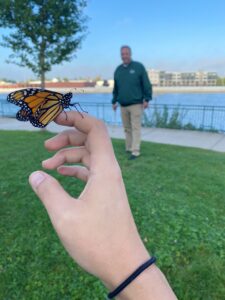
A butterfly visits our soon-to-be pesticide-free park in Grand Rapids!
On Giving Tuesday, December 1st, Midwest Grows Green (MGG) will directly email our two LawnandLand.org templates to individuals that donate $25 or more at bit.ly/MGGdonation. The two templates of the “Generic IPM Policy” and the “Lawn Maintenance IPM Workplan” help any park district, school district or municipality implement MGG’s seven essential natural lawn care (NLC) steps for sports and recreational fields: (1) Prioritizing Parks, (2) Cultural Practices, (3) Weed & Pest Control, (4) Program Implementation & Improvement, (5) Program Safety, (6) Managing Costs and (7) Community Engagement. Given that there are seven essential NLC steps, we decided to share seven ways our LawnandLand.org templates will help your community eliminate synthetic pesticides and fertilizers on sports and recreational fields.
Our templates:
- Streamline NLC implementation in your community- MGG’s templates detail clear and succinct NLC policies and protocols that municipalities, park districts and school districts can easily adopt. The local authorities that decide to formally adopt both templates will deliver their NLC services more effectively because the templates (1) ensure consistency in the actions of staff, (2) avoid any uncertaninty for how to handle particular situations and (3) increase transparency between the local authority and the public.
- Avoid excessive, unnecessary and harmful synthetic pesticide and fertilizer use- In line with MGG’s core mission to eliminate synthetic chemical use on grounds, our templates provide an exhaustive list of protocols to implement before resorting to chemical control of a weed or pest. These protocols include (1) monitoring the pest and weed populations, (2) establishing tolerance levels and (3) identifying a range of preferred cultural, mechanical and biological controls for the pest or weed before chemical control. Finally, the templates list reduced-risk or natural products to consider for control of a weed or pest population that disrupts the playability or functionality of a field.
- Support NLC practices with real world examples of implementation- You will find that MGG and LawnandLand.org has examples of implementation in the Midwest for every NLC practice or policy mentioned in the templates. Want examples of compost topdressing? Hear from North Shore Country Club’s Golf Course Superintendent, Dan Dinelli, how he incorporates high quality compost on his fairways at bit.ly/DinelliComposting. Having trouble clarifying the importance of soil testing for your community’s lawn maintenance program? MGG’s soil and turf scientists answered questions about the critical role of soil tests at bit.ly/MGGwhytesting.
- Reassure decision-makers regarding the practicality of NLC- MGG finds that offering solutions, and a lot of them, to reducing pesticides on our sporting and recreational fields best motivates change. Our templates and LawnandLand.org have plenty of solutions to ease decision-maker concerns regarding the time, costs and expertise needed to transition to NLC. Examples include shifting time and resources to management on the most highly trafficked portions and using marketing collateral to educate the community about the transition.
- Ensure continual lawn maintenance improvement- The “Generic IPM Policy” and the “Lawn Maintenance IPM Workplan” includes recordkeeping and evaluation steps that allow for the fine-tuning of a lawn maintenance program. Tracking the program over time determines the effective pest and weed control methods to continue or the ineffective methods to replace.
- Align with sustainability commitments- Many local governments seek opportunities to demonstrate their leadership in addressing climate change, environmental pollution, infectious and chronic diseases and more. MGG’s templates represent the gold standard for ameliorating the far reaching environment and public health impacts caused by conventional landscaping. The City of Grand Rapids, City of Urbana, Chicago Park District and more have used MGG’s templates to bolster their climate or sustainability commitments.
- Enable further action in sustainable landscaping- MGG received expert input when creating the LawnandLand.org templates. We incorporate these templates in all our work including our new natural lawn care technical assistance program. Two soil and turf experts involved with developing these templates, Alec McClennan of Good Nature Organic Lawn Care and Vytas Pabedinskas of Save Our Soil Inc., now apply the templates in their work for the NLC technical assistance pilot projects in Grand Rapids, Elgin and River Forest. Communities that pass or implement these templates significantly facilitate our work to eliminate synthetic chemicals on highly trafficked fields and all fields where children, pets and pollinators live, learn and play!
Are you ready to eliminate synthetic chemicals on sports fields, playgrounds and all landscapes? Then please donate $25 at bit.ly/MGGdonation on or before Giving Tuesday on December 1, 2021. Your donation will directly support our new NLC technical assistance program and MGG Week March 21-26, 2021. Thank you!
